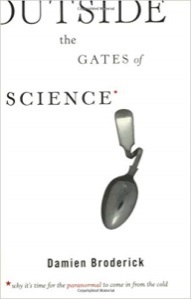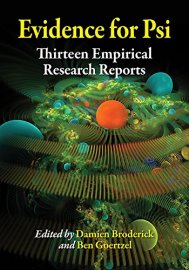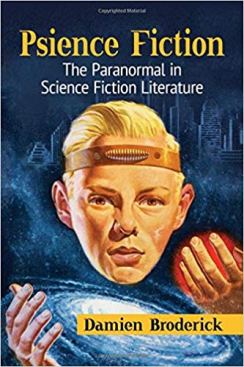Carlos S. Alvarado, PhD, Research Fellow, Parapsychology Foundation
Although I have not personally met Dr. Damien Broderick, I have corresponded with him and I have followed his previous writings in parapsychology, mainly his high quality books Outside the Gates of Science: Why It’s Time for the Paranormal to Come In From The Cold (Thunder’s Mouth, 2007), and Evidence for Psi: Thirteen Empirical Research Reports (edited with Ben Goertzel; McFarland, 2015). I commented on this last book in a previous blog.

Damien Broderick


Damien is a well-known and critically acclaimed Australian writer about science fiction and other topics who has published numerous books. The one featured here, Psience Fiction: The Paranormal in Science Fiction Literature (Jefferson, NC: McFarland, 2018) is the best book about psychic phenomena in the science fiction literature.

Here is the table of contents:
Preface
Introduction
- 1935 Donald Macpherson (George Humphrey), Go Home, Unicorn
- 1935 Olaf Stapledon, Odd John
- 1939/51 E. E. Smith, History of Civilization [runner-up special Hugo 1941/2016]
- 1940/46 A E van Vogt, Slan [special Hugo 1941/2016]
- 1949/52 James Blish, Jack of Eagles
- 1949/66 James H Schmitz, The Witches of Karres
- 1952 Alfred Bester, The Demolished Man [1st Hugo]
- 1952 Zenna Henderson, The People stories
- 1952 J. T. McIntosh, The ESP Worlds
- 1953 Theodore Sturgeon, More than Human,
- 1953-54/56 Mark Clifton and Frank Riley, They’d Rather Be Right, [2nd Hugo]
- 1953/58 Mark Clifton, “What Thin Partitions” to “Remembrance and Reflection”
- 1954 Wilson Tucker, Wild Talent
- 1955 James H Schmitz, The Ties of Earth
- 1955 John Wyndham, The Chrysalids/Re-Birth
- 1956 R A Heinlein, Time for the Stars
- 1956 Frank M Robinson, The Power & Waiting
- 1956 George O. Smith, Highways in Hiding
- 1956-57 Alfred Bester, The Stars My Destination
- 1958 Lan Wright, A Man Called Destiny
- 1958— Marion Zimmer Bradley, Darkover series
- 1958 Jack Vance, “Parapsyche” & “The Miracle Workers” & “Telek”
- 1959/61 “Mark Phillips” [Randall Garrett and Laurence M. Janifer],
Brain Twister [“That Sweet Little Old Lady”]
Impossibles [“Out Like a Light”]
Supermind [“Occasion for Disaster”]
- Stories I:
1949 Katherine MacLean, “Defense Mechanism”
1950: C.M. Kornbluth, “The Mindworm”;
1952 Walter Miller, Jr., “Command Performance”
1953 Isaac Asimov, “Belief”
1953 Algis Budrys, “Riya’s Foundling”
1955 Cordwainer Smith, “The Game of Rat and Dragon”
1956 Brian W. Aldiss, “Psyclops”
1956 J. T. McIntosh, “Empath”
1957 Poul Anderson, “Journeys End”
- 1962 Arthur Sellings, Telepath
- 1962/63 Keith Woodcott aka John Brunner, “Crack of Doom”/The Psionic Menace
- 1964 John Brunner, Telepathist / The Whole Man
- 1967-75 Dan Morgan, The Sixth Perception series:
The New Minds (1967);
The Several Minds (1969);
Mind Trap (1970);
The Country of the Mind (1975)
- 1967 Richard Cowper, Breakthrough
- 1968— Anne McCaffrey, Talents Universe
- 1969 Philip K. Dick, Ubik (etc)
- 1969 Colin Wilson, The Philosopher’s Stone
- 1970 Joanna Russ, And Chaos Died
- 1971 Lester del Rey, Pstalemate
- 1972 Robert Silverberg, Dying Inside
- 1975 Katherine MacLean, Missing Man
- 1975 Robert Silverberg, The Stochastic Man
- 1976 Octavia Butler, Mind of My Mind
- 1982 Joan D. Vinge, Psion
- 1987 Lucius Shepard, Life During Wartime
- 2011 Carrie Vaughn, After the Golden Age
- 2016 Connie Willis, Crosstalk
- Two Novels by Psychics (1978, 1999)
- Stories II:
1961 Poul Anderson, “Night Piece”
1971 Robert Silverberg, “Something Wild is Loose”
1978 C. J. Cherryh, “Cassandra” [Hugo for best short story]
1991 Brian M. Stableford, “The Oedipus Effect”
Conclusion
Appendix 1– A Brief Guide to Paranormal Research
Appendix 2 – Psi and Afterlife in Psience Fiction
Interview
Can you give us a brief summary of the book?
Here is a summary from the publisher:
“Science fiction has often been considered the literature of futuristic technology: fantastic warfare among the stars or ruinous apocalypses on Earth. The last century, however, saw through John W. Campbell the introduction of “psience fiction,” which explores themes of mind powers—telepathy, precognition of the future, teleportation, etc.—and symbolic machines that react to such forces. The author surveys this long-ignored literary shift through a series of influential novels and short stories published between the 1930s and the present. This discussion is framed by the sudden surge of interest in parapsychology and its absorption not only into the SF genre, but also into the real world through military experiments such as the Star Gate Program.”
What is your background in parapsychology, and with the topic of the book specifically?
I grew up as a pious Catholic working class kid in Australia during the 1950s, and to the horror of my parents became infatuated with gaudy science fiction comics and magazines. The more sophisticated magazines (but often still quite garish) were not easily found in Australia back then, but a factory worker living across the street allowed me to borrow his copies of the British New Worlds and Science Fantasy, and the premier US zines Astounding and Galaxy. What most captivated me was the range of psi-inflected tales in the early to mid-1950s: stories closer to magic, really, than to science, like Star Wars decades later.
Several elements attracted me, especially a frequent emphasis on quirky intelligent characters, often despised but gifted with unusual abilities such as telepathy, precognition, clairvoyance and teleportation. I knew this was all wild fiction, but it let my imagination soar freely. Imagine my astonishment when my mother one day brought home from the library (I was a sickly kid) a copy of J.B. Rhine’s The Reach of the Mind. What! This man was a scientist and yet he claimed that psi abilities were real! I started testing it alone or with my younger siblings, and had some hair-raising successes.
Then conventional attitudes kicked in, and I decided psi was just a story-telling device after all. I went to university to study literature and philosophy, and was introduced to Len Kane, the former teacher of a uni friend, a clinical psychologist a few years older than us with an interest in psi. In 1970, after I’d started work in journalism, I read an article in Analog (the spruced-up version of what had once been called, with vulgar brashness, Astounding) describing a repeated-guessing, majority-vote approach to telepathy that had worked in the lab, although only just.
I was struck by the realization that this approach might be used to create a real-world psi application based on getting messages from the future—controlled precognition! I rushed to where Len had a post at an interstate university, and we built a monstrous noisy machine in the lab that recorded our guesses at a future string—a target which, naturally, was generated by a horse race some days hence. The first time we tried it, we got the right horse. This was probably the most electrifying and delightful experience of my life. We planned repetitions, anticipating our Nobel Prize. But it didn’t work the second time, or the third time… Just a coincidence on the initial test? Or had some psychological barrier or unconscious angst blocked our psi after that first shock?
I went back to old publications where somewhat similar approaches to psi application had been reported. Some were successful in just the way I expected; others were apparently failures. I taught myself enough statistics to reanalyze these early results and in quite a number of cases found that the experimenters had simply failed to compensate for guessing biases. Using internal controls (essentially, tabulating how frequently a certain symbol was chosen when it was randomly chosen as the target, compared with its score when it was not target), I was able to recover correct results from famous, allegedly debunked experiments with huge numbers of participants (such as the Zenith radio tests in the 1930s). I ran a rather over-ambitious newspaper precognition test, and obtained some provocative results.
Meanwhile, I had started writing science fiction and selling it both in Australia and the US. In 1980, I published a novel titled The Dreaming Dragons that was selected as one of the 100 best since Orwell’s Nineteen Eighty-Four. The following year I flew for the first time to the US, and spent several days with the Rhine researchers in Durham. Eventually I wrote a popular science study of psi in general and my results after obtaining three quarters of a billion guesses at a major Australian lottery. Many years later I revised and expanded my treatment of such data in Knowing the Unknowable, which is full of charts and numbers. It failed to sell a million copies, alas.
What motivated you to write this book?
All of the above is the background to my continuing interest in psi phenomena, enhanced when I had the good fortune to be invited to join a closed online list of psi experts. Few of them agree with each other over the metaphysics of psi—how it works, what it is for (in evolutionary terms, for example), what its relationship is to consciousness and philosopher David Chalmers’ “Hard Problem.” I summarized a lot of this in Outside the Gates of Science, which was quite well received by the psi community and even persuaded Dr. Ben Goertzel, a brilliant polymathic AI researcher, that there actually is something in these preposterous claims. That led to Ben’s and my co-editing a hefty book from McFarland, Evidence for Psi. Somewhere during all this I’d done a PhD in critical literary theory (and published 70 books), and I realized that it might be worth going back to those stories about psi that had so enthralled me when I was 12 or 14, and look at the impact of psi research on science fiction and of science fiction on parapsychology. That became Psience Fiction, a term I borrowed from an English reviewer of Alfred Bester’s spectacular psi-futurist novel The Stars My Destination from the late 1950s.
But why did I do it? Because I still love science fiction and remain endlessly curious about psi, and I wanted to put them together across the last century or so and see what the result looked like. It was a lot of fun.
Why do you think your book is important and what do you hope to accomplish with it?
Well, psi is obviously important yet still often ignored or disparaged by scientists who have never bothered to investigate its evidence tracks. Meanwhile, science fiction in the previous century engaged with serious work on atomic power (and weapons), space flight, telecommunications, genomics, etc. Its most influential editor, John W. Campbell, of Astounding/Analog fame, was obsessed with psi in the mid-century. What could have happened that apparently caused its core audience to lose interest, especially at the very moment that real-world psi research was being funded by the US government, other nations, and some major corporations? I think my book is the first to approach this topic seriously and not with its tongue snidely in its cheek.
But I don’t wish to be solemn—I hope your blog readers will find it intriguing and amusing, as I did writing it.

I’m surprised that Frank Herbert’s classic DUNE novels aren’t covered in this book (or aren’t in the table of contents, anyway). They’re major science fiction works, and psi figures prominently in them.
I’ve been waiting for a book such as this. Kudos to Damien Broderick for writing it, and thank you for posting this interview with him. By the way, Dr. Alvarado, what are your “psience fiction” favorites (if, indeed, you have any)?
Thanks for your comment.
I have not read sci-fi in years. But I like movies, such as Forbidden Planet. https://www.imdb.com/title/tt0049223/
I always think I have a pretty strong library of sci-fi books I have read, and I glance at this list and realize there’s a lot more out then then I have ever even heard of.